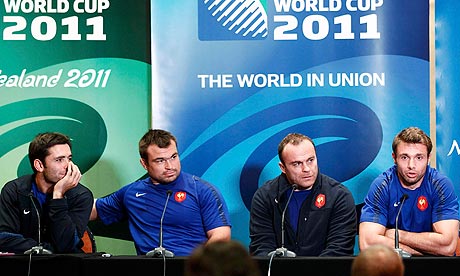
A RIDDLE WRAPPED IN A MYSTERY INSIDE AN ENIGMA
France, as Churchill once said about Russia, are a riddle wrapped in a mystery inside an enigma. As one of their travelling journalists remarked before Les Bleus' media conference on Wednesday morning: "They are only at peace if they are at war."
France have been peaceful this week, basking in the glow of their first victory over England in the knockout stage of a World Cup, a game few expected them to win after finishing their group with two defeats, the second against Tonga, who were left cursing letting in Canada for a late try the week before.
Wales, Saturday's semi-final opponents, know all about French volatility. The last time they faced them, in Paris in the final match of the 2011 Six Nations, Les Bleus had suffered what their media called a catastrophe: they had lost to Italy for the first time in the championship.
The France coach, Marc Lièvremont, not someone who is known for counting to 10 as he battles with his emotions, laid into his players, calling them cowards. "They have betrayed me and they have betrayed the national team shirt," he said. "I was ashamed. This match was an hallucination. The players are good guys but cursed with what is obviously cowardice."
He went on, in a comment that could have been made about England this month: "They are not even capable of admitting to their own mistakes. Perhaps it is a trend among the new generation." A week later, they defeated Wales comfortably but the harmony brought about by victory did not last long.
Lievremont is only 15 months older than Martin Johnson and they both seem to have found difficulty bridging the near generation gap. Johnson would have been justified in sending at least one player home from the World Cup after a series of incidents off the field that, while probably not worthy of the ultimate sanction if treated in isolation, had such a ruinous effect cumulatively that someone should have been made an example of.
Incidentally, the reaction to England's ball-tampering was interesting. Rugby World Cup Ltd was content to let England deal with the matter in-house and two members of the management team were suspended for one match.
The nature of the offence was to increase the chances of a goal being kicked. What was Bloodgate 30 months before other than an attempt, by subterfuge, admittedly elaborate, to get back on to the field a player who, although injured, offered Harlequins the best chance of kicking the winning goal against Leinster?
It earned Dean Richards a three-year ban and prompted the Rugby Football Union to issue a five-point charter in September that banged on about core values – teamwork, respect, enjoyment, discipline and sportsmanship. "We speak out if our team or sport is threatened by inappropriate words or actions," said the governing body in the definition of teamwork. Really?
England have gone and their conquerors are 80 minutes away from their third final. One omen for France is that there was a 12-year gap between their two finals and it is 12 years since they played in the second, the year Wales hosted the event. England are also the only Six Nations team they have lost to in the tournament, but it will be the first time they have faced Wales.
Four of the France squad sat on the top table at their media conference on Wednesday as if the turmoil that blighted the end of their group campaign had never happened. Vincent Clerc, Dimitri Yachvili, Nicolas Mas and Jean-Baptiste Poux talked about the strong spirit within the squad, the respect they had for Wales and their collective appreciation that it would probably be their last chance of making a World Cup final.
France looked at peace. The theory that they had one big match in them in a World Cup, after which they blew up and faded away, was dismissed. Something may have been lost in translation, but it appeared they did not regard England as sufficiently strong enough to need a major performance to beat.
The France defence coach, Dave Ellis, did say that Wales were always France's toughest opponent in the Six Nations, bunkum enough to see where he and the players were coming from. They will need their big game against Wales, and if they win they will have to find a new line of reasoning next week in the build-up to the final.
It has the potential to be one of the matches of the tournament. France were inhibited against England in the 2003 and 2007 semi-finals but played with abandon against New Zealand in 1999 and adapted well to a waterlogged pitch in 1995 against South Africa in Durban, supremely unfortunate to lose.
For a team which is said to be inconsistent, it will be France's fifth successive appearance in the semi-finals, a record New Zealand and Australia cannot match, never mind South Africa and England. Only once, in 1991, have they failed to make the last four.
They have played Australia once in the knockout stage and New Zealand twice, winning each time, and their one meeting against South Africa saw the Springboks awarded a try that television replays showed should not have been given while Les Bleus were denied one that looked to have been legitimate.
What can be said about France is that they have yet to turn up in a final, losing to New Zealand by 20 points in 1987 and Australia by 23 in Cardiff 12 years later. They win battles, but not yet the war.

